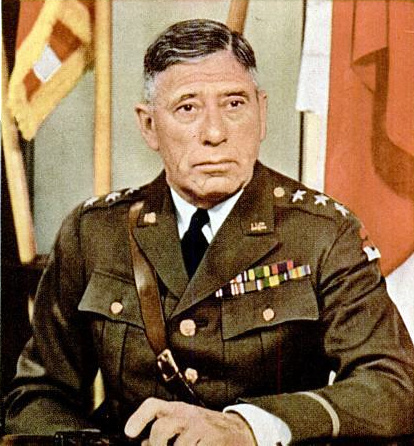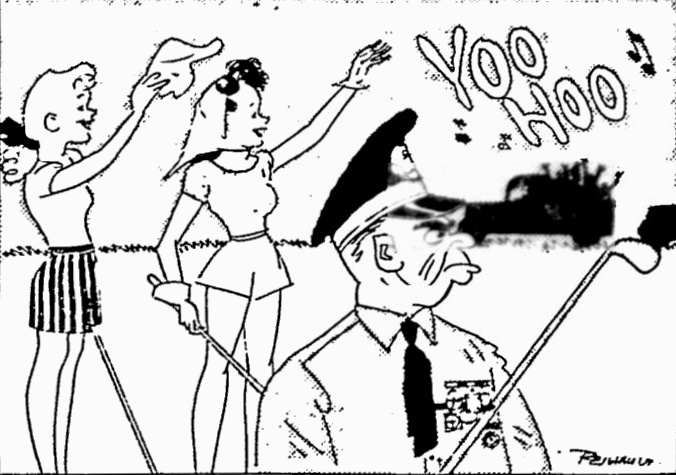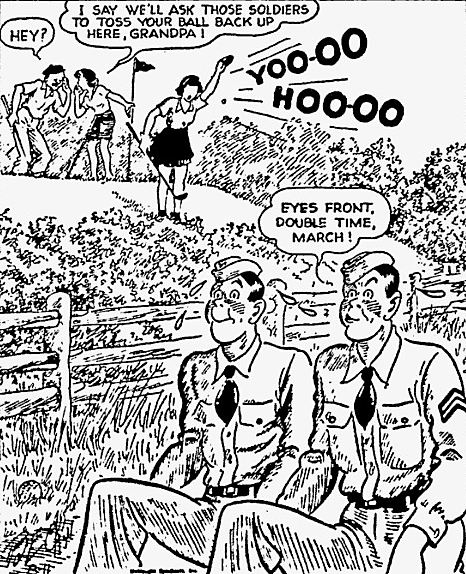The Pittsburgh Press (July 14, 1941)

I DARE SAY —
…
Yoo-Hoo
…
By Florence Fisher Parry
Another Colonel was kept waiting in a supply store while rookies were treated like gods by the patriotic salesman who, pushing the Colonel aside, said brusquely:
Sorry, but the Army comes first. You’ll have to wait.
Now this came, of course, from the lamentable fact that the Colonel was affecting civilian clothes, and so should take, with manly grace, the consequences.
The trouble is once authority is vested in a human being, it cannot easily be laid off with one’s clothes. The germ of it sticks and at the slightest provocation begins to act up. That is why human nature being the thing it is (EVEN in the U.S. Army). I think the only solution to the present difficulty is to devise some kind of military order which would OBLIGE all superior officer to wear their uniforms while at large.
They should, I dare say, be permitted the surreptitious doffing them at night in the sanctuary of their own bedrooms in favor of the routine nightshirt or at best summer pajamas.
Which reminds me of a pleasant little story about one of our high dignitaries of the Church, a certain Bishop of unexampled dignity who made up for his deafness with a thousand courtly social attributes.
One evening at dinner he was placed next to a severely inhibited old maid who found his august proximity almost too overwhelming. Casting utteringly about for conversation she spied a beautiful wax banana nestled in an elaborate fruit centerpiece, and forthwith queried.
Your Excellency, are you fond of bananas?
To which her distinguished companion replied, after weighty consideration:
Well, no, ma’am. I must say I still prefer the old-fashioned nightshirt.
Generals can take it
It is told of General Smedley Butler how he was refused entrance to a Marine barracks by a Private who was keeping guard at the gate. The General fumed, raged, let forth the most impressive invective, proclaiming his identity to the resounding hills, all to no avail.
The guard persisted:
Sorry, sir, my instructions…
The General retried, beaten and went back to his post. Next morning, the Private was made a Sergeant by his delighted General, who knew a good soldier when he saw one.
The nicest thing about the Yoo-Hoo incident (and of course that regiment is destined to go down in military history as the Yoo-Hoo Regiment) is the attitude of the boys who were penalized by General Lear. They resent very much the public razzing their General has received and the Congressional defense given them. Far from objecting to their punishment, they recognized its fairness and are completely in sympathy with their General’s point of view.
Indeed, it is said in Army circles that the only superior officer who is observed to strut his authority is the Second Lieutenant. As the Colonel said to the offending recruit:
O.K., by me, fellow, but just see that you don’t let it happen to a Second Lieutenant!
Stuff and nonsense
I’m getting just a leetle bit weary of the long-suffering martyred mothers who are already looking upon their sons’ service in the Army as a personal sacrifice. This thing of “giving up my son” has a sacrificial odor which is a poor substitute for the true spirit of patriotism.
Sacrifice nonsense. Nine times out of 10 it’s the break of their sons’ lives. What our boys are “giving up” is considerable, may be compared with what they’re getting as an all-out gift from Uncle Sam. They’re being released by the thousands from their mothers’ apron springs, for one thing.
They’re being treated for the first time in their lives (many of them) like MEN instead of pampered little boys. They’re having their health checked upon and the necessary deficiencies supplied without cost.
They’re living a healthy out-of-door life, being provided the greatest opportunity to get FIT that is ever likely to come to them, and a physical hardening-up training which will stand them in good stead all their lives.
They’re being given to chance to learn to have respect for obedience, equality, fraternity, and what it means to be a social creature in a social world.
There isn’t a thing they’re learning, outside the bare mechanics of warfare, that they can’t utilize later when they return to civilian life. No REAL experience is ever wasted. It ALL can later be utilized in one form or other.
Best training
Even supposing the training is hard, is disappointing, reacts badly upon the recruit who can’t take it, MORE THAN EVER is just that kind of experience needed for him.
And besides, it’s HIS experience, it’s HIS life, it isn’t his parents’.
I am sacrificing my son. I am giving him up. If anything happens to him what will I do?
Shame, mothers, to indulge such selfishness. It is the rankest kind of self-centeredness. It is worse than the whine that is sometimes heard by a bereaved wife or mother.
What is to become of ME?
Mourning their own plight instead of their dead!
War or peace, ahead, this experience for our boys is the best of all training for whatever is to come to America.



